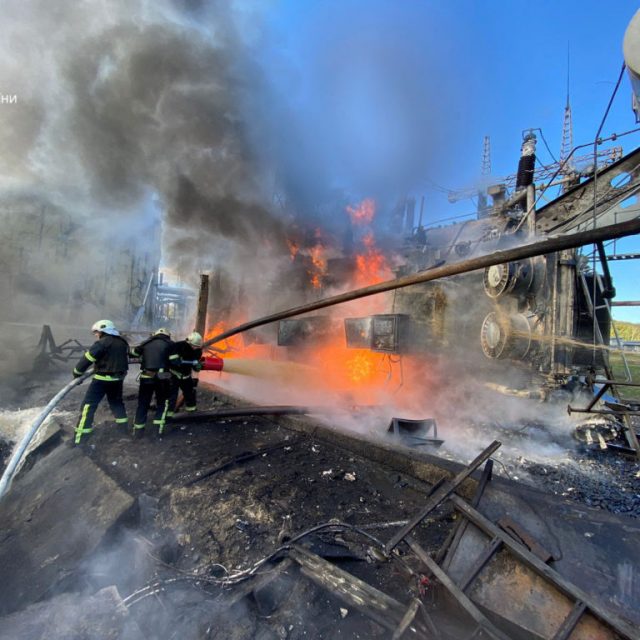On 7 October Russia once again demonstrated complete disregard for international norms by striking civilian vessels transporting food. This time, Russian forces attacked port infrastructure in Odessa using ballistic missiles, damaging a Palauan-flagged ship, “OPTIMA,” which was waiting to load agricultural products. As a result of the attack, a 60-year-old Ukrainian was killed, and five foreign crew members were injured. This attack marked the second in recent days. On 6 October the Saint Kitts and Nevis-flagged vessel “PARESA,” loaded with Ukrainian corn for export, was also shelled. This brings the total to twenty civilian ships that have been affected by Russian attacks on Ukrainian ports. Fortunately, none of the 15 crew members, which included citizens of Egypt and Syria, were harmed. The ship carried about 6,000 tons of Ukrainian corn—an entirely civilian cargo for international markets.
These attacks are part of Russia’s broader strategy to dismantle infrastructure related to Ukrainian grain exports. Since July 2023, when Russia unilaterally exited the Black Sea Grain Initiative, the number of attacks on civilian vessels and Ukrainian ports has significantly increased. Over 30 strikes have destroyed more than 300,000 tons of grain, leading to a monthly export reduction of 3 million tons. Such actions have caused a sharp rise in food prices and threaten hundreds of millions of people, especially in African and Asian countries that rely on Ukrainian exports.
In addition to attacking vessels, Russia regularly strikes Ukrainian ports along the Danube and near the Romanian border. On 2 October Russian drones targeted a ferry terminal and grain warehouse in the Izmail region, damaging trucks and injuring two drivers, one of whom was a Turkish citizen. These attacks undermine food supply chains and pose a direct threat to the security of neighbouring European countries, such as Romania, increasing regional tensions and disrupting international trade routes.
Belgium, as an important member of the European Union and a supporter of international law, has condemned Russia’s actions aimed at destroying Ukraine’s civilian infrastructure and obstructing food exports. The Belgian government and its key representatives, including Foreign Minister Hajja Labib and Prime Minister Alexander De Croo, have repeatedly emphasised the unacceptability of using food as a weapon in global politics. They have stated that such actions by Russia pose a serious threat not only to Ukraine but also to the international food supply system, endangering countries that depend on food imports, particularly in Africa and Asia.
Foreign Minister Hajja Labib has called for increased sanctions pressure on Russia and support for Ukraine from the international community. She stressed that attacks on Ukrainian grain ports are not only violations of international law but also deliberate attempts to create a food crisis in hunger-vulnerable countries. Prime Minister Alexander De Croo has also expressed concern over the renewed attacks by Russia on Ukrainian ports and vessels, emphasizing that Belgium will continue to support Ukraine and assist in finding alternative routes for food exports.
The EU, including Belgium, is already taking active steps to mitigate the effects of Russian aggression. The establishment of so-called “solidarity corridors” through EU countries has enabled the overland transport of Ukrainian grain exports. However, the effectiveness of these routes is limited, and they cannot fully replace maritime pathways through the Black Sea, especially given the ongoing attacks on ports and vessels. In response to Russian attacks, Belgium is also participating in discussions within the European Union about imposing additional sanctions on Russia and enhancing aid to Ukraine, including providing air defence systems to protect critical infrastructure.
One in eleven people worldwide suffers from food shortages. According to the UN, Russia’s actions exacerbate this crisis, increasing the number of people on the brink of starvation. Approximately 400 million people globally depend on Ukrainian food exports, and Russia’s attacks threaten their survival.
Despite the ongoing aggression, Ukraine remains a key player in the global food market and is developing alternative routes for grain exports. However, more efforts from the international community are needed to protect infrastructure and supply security. Programs such as “Grain from Ukraine” have already helped send tens of thousands of tons of grain to countries suffering from hunger, such as Somalia, Ethiopia, Kenya, and Yemen. This initiative plays a crucial role in global food security, helping to prevent crises in the world’s most vulnerable regions.
The 25th meeting in the Ramstein format is scheduled to discuss expanding military assistance to Ukraine. The focus will be on providing air and missile defence systems, long-range weapons, and strengthening support for the Ukrainian armed forces. A key issue will be permitting Ukraine to use long-range weapons against legitimate military targets on Russian territory, allowing for more effective protection of civilian infrastructure, including ports critical for food exports.
This decision could be a significant step in stabilising global food security, as Russia’s attacks on Ukrainian ports continue to disrupt global grain supply chains. The international community, including Belgium, must intensify diplomatic and economic pressure on Russia, providing Ukraine with the necessary means for defence, including long-range weapons. This will help prevent further attacks on civilian infrastructure and strengthen food security.




